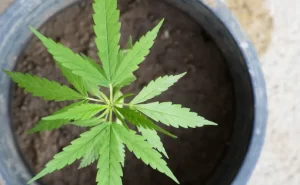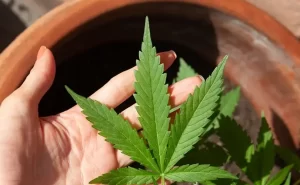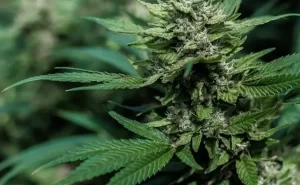It Is Possible That THCV and CBD Can Help With Weight Loss
There is some ongoing study on the possible effects of THCV and CBD for weight loss. Here’s a breakdown of what we now know:
Appetite Suppression: THCV, or tetrahydrocannabivarin, a chemical found in cannabis plants, is gaining popularity as an appetite suppressant. Preliminary research suggests that THCV may interact with the body’s endocannabinoid system, which regulates appetite. This interaction may result in lower calorie consumption, making THCV a prospective weight-management treatment.
In one study published in 2016, THCV was observed to diminish food intake in both mice and rats. The researchers speculated that THCV’s appetite-suppressing effects were caused by its ability to activate endocannabinoid system receptors that regulate hunger and satiety.
Furthermore, the study discovered that THCV may improve insulin sensitivity, aiding weight management.
It does not cause the psychotropic effects that are commonly associated with cannabis.
Another study published in 2019 discovered that THCV may be especially beneficial in lowering cravings for sweet and fatty foods. The researchers hypothesized that this impact was caused by THCV’s ability to activate endocannabinoid receptors involved in reward processing.
While additional research is needed to understand THCV’s potential as an appetite suppressant properly, the first findings are encouraging. THCV is also unique in that it is non-intoxicating, which means it does not cause the psychotropic effects that are commonly associated with cannabis.
This makes it a potentially appealing choice for those looking to control their hunger without getting the high associated with other cannabis components.
Preliminary findings indicate that THCV could be an effective tool in the fight against obesity and related health issues.
THCV is a potential option for those seeking to manage their weight and lower their calorie intake. While additional research is needed to understand its effects properly, preliminary findings indicate that THCV could be an effective tool in the fight against obesity and related health issues.
Metabolic Effects: THCV may alter metabolism by interacting with cannabinoid receptors, perhaps increasing blood sugar homeostasis and lowering insulin resistance, which can be suitable for weight management.
Reduced Appetite: According to research, CBD may alter appetite by interacting with the endocannabinoid system, perhaps leading to satiety and reduced food intake in some people.
Fat Browning: According to specific research, CBD may help promote fat cell browning. Brown fat has a higher metabolic rate and burns more calories than white fat.
Limited Evidence: Research on THCV and CBD for weight loss is still in its early stages, with further studies needed to confirm these potential benefits.
Dosage & Delivery: The effectiveness of these cannabinoids for weight loss may vary depending on the dosage and method of delivery (e.g., oil, capsules).
Not a Magical Bullet: While THCV and CBD may have weight-management benefits, they are unlikely to be short fixes. A good diet and consistent exercise remain essential for long-term weight loss.
Overall:
While THCV and CBD have shown potential in weight management, more research is needed. If you’re thinking about using these cannabinoids for weight loss, consult your doctor first, especially if you have any underlying health concerns. They can advise whether this is a safe and appropriate action for you.













